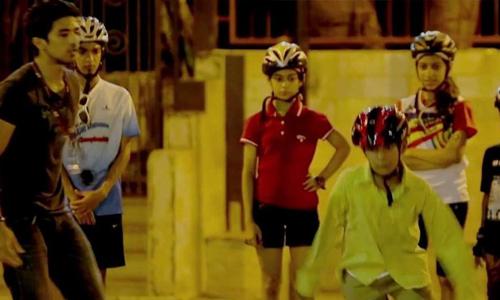 nil
nil
No childs play
The genre called childrens films or films for children is too broad a label to understand what these films stand for. Featuring a child as the protagonist does not necessarily imply attracting a child audience. In fact, most of these films raise questions about the adult worlds understanding and mistaken perceptions about the needs, desires and problems of children. Shoma A. Chatterji analyses as Amol Guptas Hawa Hawai hits screens
Since Raj Kapoor’s Boot Polish (1954) became a box office hit, films featuring children in central roles have addressed the adults in the audience. Though aiming at entertainment of the children they are also for parents, teachers, social workers etc offering education and information. Boot Polish treats the plight of children as a social problem. The two orphaned kids are forced to confront the harsh realities of poverty within the slum environment in an exacting city like Mumbai. The film ends on a note of empathy and a positive resolution for the two orphans.
Boot Polish, (Virtue Ethics of Boot Polish and Dosti as compared with Slumdog Millionnaire in Visual Anthropology, 23, 44-59, 2010) represents social realism, in a society that still holds on to some ideals and, instead of taking the agency away from the children, the film strongly emphasises that children should move away from begging or other crimes and start earning their livelihood through honest hard work. The entertainment factor, like any RK film was sustained through brilliant songs and a prize-winning musical score.
“Dhool ka Phool (1959) by Yash Chopra links the imagination of childhood to the concept of the nation. It was an appeal to Nehruvian secularism and personified a liberal, inclusive vision of India. “This cinematic imagination examines the child struggling to deal with hunger, poverty, urbanization, religious identity and striving for self-respect, individualism, secularism, autonomy and social justice. These issues are also concomitant with that of the emerging modern nation state,” explains Nidhi Gulati in her paper presented at a Conference on “Child Actors / Child Stars – Juvenile Performance on Screen” in September 2011 at the David Putnam Medical Center of the University of Sunderland.
In the recent past, children as major characters have aimed at adults came across in Taare Zamin Par, an incisive comment on ignorance among parents about little-known disabilities their children suffer from. Taare Zamin Par is a commercial film designed to tug at the hearts of the audience and rake in the big bucks. But the film introduces the Indian masses to a new term adding to their limited vocabulary of learning disabilities – dyslexia. The nation woke up to Ishaan Asthana’s pain that began with the basic ignorance of his parents and teachers about this little-known but grave learning disorder.
I Am Kalam is optimistic, happy and full of cheer. Chhotu is a spirited, cheerful boy, who has a spring in his walk and has the ability to bond equally with Bhatti Mama’s female camel Lakshmi and the French tourist Lucie Aunty, who wants to take him to Delhi and put him in a school. The cheerful smile on Chhotu’s face touches the hearts of the audience. The little boy who played Kalam walked away with the National Award for Best Child Actor. It was a lesson to adults that children, if left free to make their choices, they can bond with other children and that different socio-economic backgrounds do not matter.
Chillar Party (2011), directed by Nitesh Tiwari and Vikas Behl, takes the same argument a bit further. It is about a batch of boys who are brats in different guises. They unite to teach a lesson to adults about equality among children, never mind if one is poor and illiterate and the other is not. It won the National Award for the Best Children’s Film and the batch of boys bagged the Best Child Actor Award in a group!
The film is hilarious, entertaining and with meaningful messages directed at adults. There is a wonderful scene of a procession by the boys of a housing complex clad in chaddis to protest the giving away of a stray dog owned by their ‘friend’ Fatka to the dog pound because the dog is considered a menace to the residents and Fatka is a very poor boy who cleans their parents’ cars!
Sheila Ki Jawani directed by Zoya Akhtar in Bombay Talkies comes across as a sharp indictment on parents who seek vicarious satisfaction through their children by forcing them to pick things that are against the children’s nature and desires. The little boy loves to dance. His dream is to perform Sheila Ki Jawani while his dominating father wants him to excel in team sports.
Stanley Ka Dabba was written, directed and produced by Amol Gupte. His son Partha Gupte plays Stanley, the protagonist. It takes one back to one’s school days where the daily dabba the boys bring from home becomes a focal point in childhood gluttony during tiffin time. Stanley is the only boy who does not bring his dabba and is roundly rebuked by the Hindi teacher who himself laps up the children’s dabbas. Why does this loveable, friendly and cheerful boy come to school everyday without his dabba? There lies the interesting twist in the tale that unveils a positive message.
Amol Gupta’s Hawa Hawai with his son Partho Gupte playing Arjun, the central character, is a story of the triumph of the human spirit, of friendship and about enjoying the journey of making one’s dream come true. Arjun moves to the big city along with his mother and little sister. He discovers a hidden world of in-line skating through coach Lucky, who mentors kids to become skating champions. While Arjun nurtures his dream to learn skating, his four friends get together to make this dream come true. In this endearing story of hope and aspirations, will Arjun’s dreams take flight?
"Children are pure, very candid and honest. It is how you work and interact with them that matters. They are a powerhouse of performance. If someone says the child does not know how to act, he is wrong," sums up Gupte.
(Shoma A. Chatterji is an award-winning film critic)
Top Headlines
-
Entertainment
Bollywood 2025: Hits, Hype and Heartbreaks as Dhurandhar Redefines the Year
December 24, 2025
-
Entertainment
Rotary Club of Calcutta East Central celebrates centenary of iconic actor Santosh Dutta with statue unveiling
December 04, 2025
-
Entertainment
Valentyn Vasyanovychs To The Victory! wins 2025 TIFF Platform Award unanimously
September 26, 2025
-
Entertainment
Chlo Zhaos Hamnet Wins TIFF 2025 Peoples Choice Award
September 20, 2025
-
Entertainment
Sholay: Golden even after fifty years
July 04, 2025
-
Entertainment
War 2: Check out Hrithik Roshan, Jr NTR and Kiara Advani's new posters
June 26, 2025
-
Entertainment
LGBTQIA+: Icelandic film Odd Fish and Brazil's Baby win big at KASHISH 2025 film festival
June 12, 2025
-
Entertainment
Katrina Kaif named Maldives tourism global brand ambassador ahead of Modi's visit
June 10, 2025
-
Entertainment
'Queen marches to conquer': Deepika Padukone joins Atlee's AA22xA6 starring Allu Arjun after 'Spirit' exit
June 08, 2025
-
Entertainment
Dakota Johnson and Chris Martin, who were in on-and-off relationship, broke up: Reports
June 06, 2025


